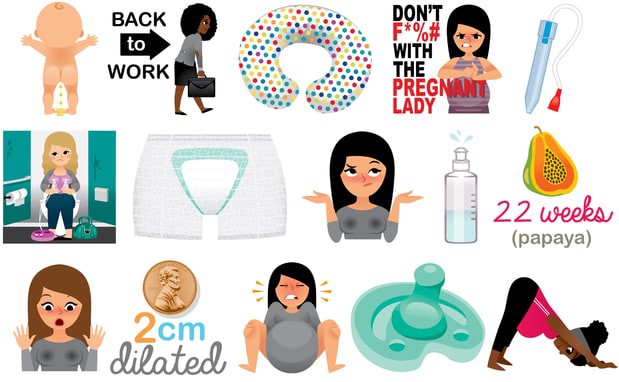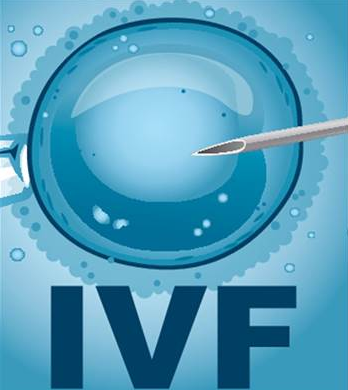Infantilize Yourself for Just $1.99
A new emoji keyboard turns pregnancy milestones into cutesy stickers

Earlier this month, a trio of mothers — Sarah Robinson, Natalie Ralston, and Hannah Hudson — released EmojiMom, a $1.99 iOS keyboard containing 250 parenthood-themed emojis. Designed, in Robinson’s words, to depict “the highest of the highs as well as the lowest of lows” of pregnancy and infant care and “help moms sending these to make their friends laugh, and moms on the receiving end to feel like someone just a text away gets what they’re going through,” the emojis dazzled the likes of “Today” and corporate-owned parenting blogs. Finally, nipple-cream tubes, postpartum mesh underwear, and notes reading “2 cm dilated” in jaunty cursive had been envisaged in emoji form.
Any user, of course, would likely recognize the tongue-in-cheek nature of these emojis; it takes a certain mutual understanding to text a friend an image of a woman horrified to discover her spontaneous lactation has stained her light-gray shirt. To be sure, the trials of conception, pregnancy, childbirth, and parenting beg to be tempered with a dose of blithe humor.
While EmojiMom is admirable in theory, it’s bizarre at best, and condescending at worst, in practice. One of its icons depicts a needle permeating an egg in a Petri dish above a dark-blue label reading “IVF”; its friendly, glossy roundness befits a Pixar scene. A sonogram, equally Disneyfied, shows the grayed silhouette of a fetus in the womb, its red cartoon heart positioned roughly anatomically accurately.

That we’ve come to this point isn’t entirely the fault of EmojiMom, however. (The product is, after all, based on the standard smartphone emojis, a set of images so pervasive that a page on nearly every pop–media site was reserved for a 200-word writeup on the introduction of a taco.) Rather, EmojiMom is merely a symptom of a larger problem: the tactic of appealing to, and profiting from, users’ emotions through infantile imagery.

Conventional business wisdom dictates that understanding users’ thoughts and moods is the gateway to effective advertising. Accordingly, faces expressing a range of emotions have become a trope of user-facing tech of the 21st century’s second decade. Facebook prompts users to “react” to updates with simple emotional iconography: heart for “love,” reddened face for “angry,” downturned eyebrows and a teardrop for “sad.” On Yelp, users can rate reviews as “useful” (yellow light bulb), “funny” (green laughing face), or “cool” (blue snowflake). As furry pink bits of facial metonymy, Lyft’s moustaches reinforce the imagined warm tweeness of the sharing economy. Ikea, Coke, and Broad City, among others, have developed customized-emoji marketing campaigns because users, to quote Swyft Media cofounder Evan Wray, “don’t see it as advertising…they see it as self-expression.” Cute visuals generate a sense of ease, a gradient of icons provides choice, and attentiveness offers validation; they’re proverbial seeds, sown to make users feel safe, valued, and entertained — and thus willing to pay, download, or hand over their information.
Nevertheless, EmojiMom purports not to be so insidious. “We will never, ever capture any of your other information [beyond keyboard access], including anything you type on any network. We’re not in the business of deception, just bringing awesome mama emoji to your phones,” its privacy policy notes. (To its credit, this is a somewhat plausible statement; the app costs users money, thus limiting the need to rely on early-stage advertisers for revenue, and isn’t a promotional campaign.)

Though EmojiMom may not share the sinister motives of the aforementioned “brands,” it’s a fruit of the age of manipulative emoji-propelled expression they have fostered. As the app ushers parenthood into this era, it raises a number of questions. Is it right to capitalize on the momentum of a cartoon-as-word trend within a context as complex, and as physically and emotionally daunting, as pregnancy and motherhood? Should profound levels of joy, fulfillment, pain, and anxiety find digital representation in doe-eyed faces and soft pastels? If one of humanity’s greatest tests of patience and endurance isn’t immune to this kind of juvenility, does the power of cute tech know no boundaries?
Undeniably, emojis have value. They embellish written language, often, in ways that words can’t. Their whimsy temporarily punctuates the drudgery of daily life. They efficiently convey moods and actions (depending on the moods and actions). But parenting — and the autonomy, resilience, and judgment it demands — warrants more nuanced recognition. With EmojiMom and its happy-face-sporting forebears, we risk approaching a time when mothers’ tools of emotional expression (and, in the minds of advertisers, their wills) increasingly resemble their children’s.